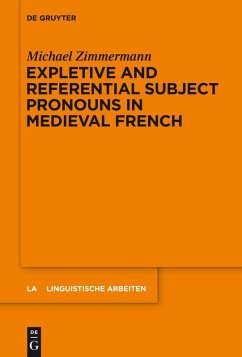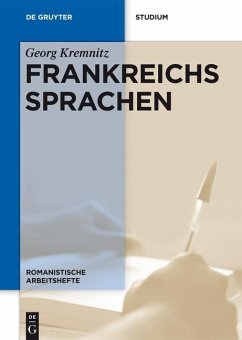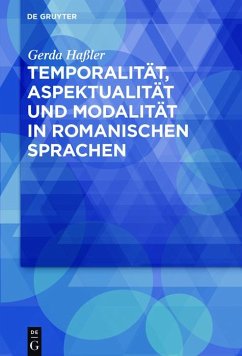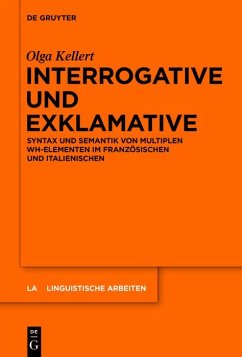
Expletive and Referential Subject Pronouns in Medieval French (eBook, ePUB)
Versandkostenfrei!
Sofort per Download lieferbar
108,95 €
inkl. MwSt.
Weitere Ausgaben:

PAYBACK Punkte
54 °P sammeln!
Die Buchreihe Linguistische Arbeiten hat mit über 500 Bänden zur linguistischen Theoriebildung der letzten Jahrzehnte in Deutschland und international wesentlich beigetragen. Die Reihe wird auch weiterhin neue Impulse für die Forschung setzen und die zentrale Einsicht der Sprachwissenschaft präsentieren, dass Fortschritt in der Erforschung der menschlichen Sprachen nur durch die enge Verbindung von empirischen und theoretischen Analysen sowohl diachron wie synchron möglich ist. Daher laden wir hochwertige linguistische Arbeiten aus allen zentralen Teilgebieten der allgemeinen und einze...
Die Buchreihe Linguistische Arbeiten hat mit über 500 Bänden zur linguistischen Theoriebildung der letzten Jahrzehnte in Deutschland und international wesentlich beigetragen. Die Reihe wird auch weiterhin neue Impulse für die Forschung setzen und die zentrale Einsicht der Sprachwissenschaft präsentieren, dass Fortschritt in der Erforschung der menschlichen Sprachen nur durch die enge Verbindung von empirischen und theoretischen Analysen sowohl diachron wie synchron möglich ist. Daher laden wir hochwertige linguistische Arbeiten aus allen zentralen Teilgebieten der allgemeinen und einzelsprachlichen Linguistik ein, die aktuelle Fragestellungen bearbeiten, neue Daten diskutieren und die Theorieentwicklung vorantreiben.
Dieser Download kann aus rechtlichen Gründen nur mit Rechnungsadresse in A, B, BG, CY, CZ, D, DK, EW, E, FIN, F, GR, HR, H, IRL, I, LT, L, LR, M, NL, PL, P, R, S, SLO, SK ausgeliefert werden.













